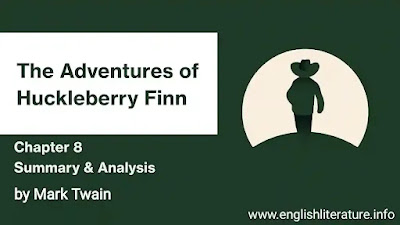Also Read
SUMMARY
The next morning, while he is relaxing on the island, he revels in the grass and the cool shade. Feeling reasonably relaxed and satisfied, he almost dozes off to sleep again. Suddenly, he hears the sound of cannon being fired. A group of people, who are in search of Huck's dead body, come down the river in a ferryboat. The search party includes Judge Thatcher, Aunt Polly, Becky Thatcher, Pap, Tom Sawyer, Jo Harper, Sid and Mary. Huck is mighty hungry but he decides not to light fire tor his breakfast, lest the smoke catches the attention of the search party. He remembers that people put mercury on loaves of bread and float them on the water since they believed that loaves will stop near a drowned body. He manages to set his hands on a loaf of bread, which has been stuffed with mercury, to hit upon his corpse.
After a hearty meal, while he sits watching the drama, the search operation comes extremely close to where he is. It is by sheer chance that they fail to notice him. When he is confident that he is safe, he pegs a tent, makes a bonfire and cooks his supper over an open fire, but feels lonely afterwards and goes to the river bank to watch the flow of water. Calmed by the river, he goes to the bed. He follows the same routine for next three days. Just when he is feeling comfortable on the island and "boss of it", he catches a glimpse of fire among the trees. Very cautiously, he goes forward to try and decipher the source of the fire. He perceives a tall, human figure with his head covered with a blanket. On going closer, he realizes that it is Jim, Miss Watson's slave. Jim, on seeing Huck whom he believes to be dead, nearly jumps out of his skin. Huck reassures him that he is not a ghost. On exchanging notes, Huck learns that Jim has run away because Miss Watson had planned to sell him to a slave trader from Orleans, for eight hundred dollars. Before Jim recounts the rest of his odyssey, he makes Huck promise him that the latter wouldn't betray his secret.
CRITICAL ANALYSIS
This chapter reinforces the fact, that, notwithstanding an absence of formal education, Huck is definitely a matured and pragmatic individual. Despite being famished, he decides against lighting a fire so as not to risk being found out. "I was preity hungry, but it warn't going to do for me to start a fire, because they might see the smoke."
His sensibility and self-restraint, in the face of such trying situations, is commendable. He has the perspicacity to look for loaves of bread so that he can manage his own affairs. Despite being merely a fourteen- year old adolescent, he has the capability and far-sightedness to manage his own affairs reasonably well. Unlike Tom, he doesn't have the security and assurance of a family that he can call his own, yet he comes out of trying situations, unscathed.
In contrast to Huck's practicality this chapter again points out the superstitions of the people. First it is the loaf of bread with mercury init that is floated to locate a drowned body. Later Jim says that if birds fly in a certain direction, it brings rain. The uneducated Huck is awed by Jim's knowledge of superstitions.
It is ironical that, though he runs away from society, he still longs for companionship. When he bumps into Jim, on Jackson's island, he is elated. He shuns society, not because he is a misanthropist but because he rejects Miss Watson's fastidiousness and Pap's brutality people who epitomize the society that offers him nothing more than a stifling environment. This embodies a human being's need to co-exist with other individuals. Nobody can live in isolation. Yet, like Huck, all of us resent the presence of certain individuals, at some point of time or the other, during our lives.
